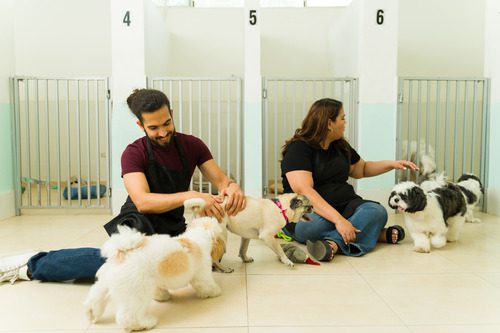All About the CIV Vaccine for Dogs

Dogs are social animals that love to interact with other pets, whether at the dog park, grooming salon, daycare, or boarding facility. While these experiences can be fun, they also come with risks—one of the most concerning being canine influenza. The canine influenza virus or CIV vaccine for dogs is an essential tool in protecting your pup from this highly contagious respiratory illness. But what exactly is CIV, and why should you consider vaccinating your dog against it? In this blog, we’ll cover everything you need to know about the CIV vaccine for dogs, how it works, and why it’s important for your pet’s overall health and safety.
What Is Canine Influenza Virus (CIV)?
Canine influenza, or dog flu, is a highly contagious viral infection that affects a dog’s respiratory system. It is caused by two strains of the influenza A virus: H3N8 and H3N2. Both strains can spread rapidly, especially in areas where dogs come into close contact with each other. While some dogs may only experience mild symptoms, others can develop severe respiratory complications that require medical intervention.
Symptoms of Canine Influenza
Dogs infected with CIV can exhibit a range of symptoms, including:
- Persistent cough
- Runny nose and nasal discharge
- Fever
- Lethargy
- Loss of appetite
- Difficulty breathing in severe cases
While these symptoms can resemble those of kennel cough, CIV tends to last longer and may cause more serious complications. Some dogs, particularly puppies, seniors, and those with pre-existing health conditions, are at a higher risk of developing pneumonia if infected.

How the CIV Vaccine for Dogs Works
The CIV vaccine for dogs is designed to protect against both H3N8 and H3N2 strains of canine influenza. Similar to human flu vaccines, this vaccine helps a dog’s immune system recognize and respond to the virus more effectively, reducing the severity of symptoms if exposure occurs.
Is the CIV Vaccine a Core Vaccine?
Unlike rabies or distemper vaccines, the CIV vaccine for dogs is considered a non-core vaccine. This means it is not required for all dogs but is strongly recommended for those at risk of exposure. Many veterinary clinics, boarding facilities, and dog daycares now require proof of CIV vaccination before accepting pets.
Who Should Get the CIV Vaccine?
While any dog can contract canine influenza, some dogs are at a higher risk than others. The CIV vaccine for dogs is highly recommended for:
- Dogs that frequently visit dog parks, boarding facilities, or daycare
- Dogs that participate in training classes, dog shows, or agility competitions
- Dogs that receive routine grooming in a shared facility
- Dogs that live in multi-pet households
- Dogs that frequently travel or come into contact with other dogs
If your pet falls into any of these categories, getting them vaccinated can significantly reduce their risk of contracting or spreading CIV.

How Effective Is the CIV Vaccine for Dogs?
No vaccine can offer 100% protection, but the CIV vaccine for dogs greatly reduces the likelihood of severe illness. Even if a vaccinated dog contracts canine influenza, their symptoms are generally much milder, and their recovery time is significantly shorter.
Does My Dog Need a Booster Shot?
Yes. The CIV vaccine requires two initial doses given 2 to 4 weeks apart, followed by an annual booster to maintain protection. If your dog is getting the CIV vaccine for the first time, make sure to schedule both doses to ensure full immunity.
Are There Any Side Effects of the CIV Vaccine?
Most dogs tolerate the CIV vaccine well, but mild side effects can occur, including:
- Temporary soreness at the injection site
- Mild fever
- Decreased appetite or energy
These symptoms usually resolve within a day or two. Severe reactions are rare but can include vomiting, swelling, or difficulty breathing. If you notice any concerning side effects, contact your veterinarian at Trinity Veterinary Hospital immediately.
How to Get Your Dog Vaccinated Against CIV
If your dog is at risk of exposure, scheduling a CIV vaccine for dogs appointment with your veterinarian is the best way to protect them. At Trinity Veterinary Hospital, we offer CIV vaccinations to help keep your pet safe from canine influenza. Our team can assess your dog’s lifestyle and risk factors to determine whether the vaccine is right for them. To book an appointment, call (405) 533-0001 or schedule a visit online today.
Tips for Preventing the Spread of Canine Influenza
While vaccination is the most effective way to protect your dog, additional precautions can help reduce the risk of canine influenza:
- Limit exposure: Avoid crowded pet facilities during flu outbreaks.
- Practice good hygiene: Wash your hands and change clothes after interacting with sick dogs.
- Keep infected pets isolated: If your dog shows flu-like symptoms, keep them away from other pets for at least 21 days.
- Regular vet checkups: Routine visits to your veterinarian can help catch respiratory infections early.
Why the CIV Vaccine Matters for Your Dog’s Health
Canine influenza is a growing concern for pet owners, especially in areas where dogs frequently socialize. The CIV vaccine for dogs offers an extra layer of protection, helping to prevent serious illness and minimize the spread of infection. When you vaccinate your dog, you’re not just protecting their health—you’re also helping to safeguard the larger pet community. If you’re unsure whether your dog needs the CIV vaccine, our team at Trinity Veterinary Hospital can help. Call (405) 533-0001 or book an appointment online to discuss your pet’s vaccination plan today.
Recent Posts
About Us
For over a decade, Trinity Veterinary Hospital has provided compassionate, faith-based care to pets in our college town and beyond. We treat every pet like family, offering routine checkups, boarding, and advanced care from a board-certified internist.
